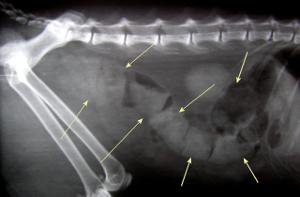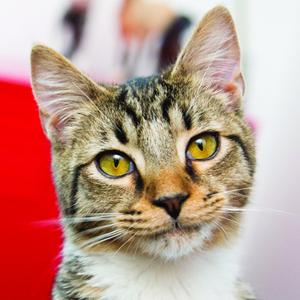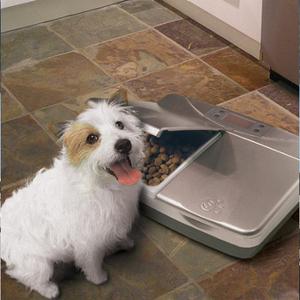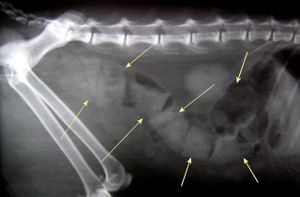 What is colitis?
What is colitis?
Acute Colitis is a general term for any inflammation or irritation of the large intestine (colon) that suddenly flares up but lasts only a short time. Chronic Colitis is a long term, difficult-to-treat, large intestine disorder.
What percentage of dogs and cats experience severe colitis?
The majority of dogs at some time in their lives will need veterinary help due to large bowel disease (colitis). Fortunately, most of these cases are transient bowel irritations and recovery is rather prompt. In a very small percentage of dogs, chronic/severe colitis is a problem. For severe cases, obtaining an accurate diagnosis of the cause and implementation of a treatment can be a challenge.
A majority of house cats, due to well-regulated dietary intake, never have colitis difficulties that require veterinary intervention. Outdoor cats with free access to hunt prey are more likely to have large bowel flare-ups.
Is colitis more common in young, adult, or senior pets?
Acute colitis is fairly common in puppies and kittens less than ten days old and can be due to a number of causes such as bacterial imbalance, intolerance to the mother’s milk, or parasites. Probably the most common cause of adult acute colitis is ingestion of a foreign substance such as plastic, bones, a dead mouse, garbage, or food contaminated with pathogenic bacteria. These substances create havoc with the entire intestinal tract and upset the normal beneficial bacterial harmony.
Is there a link between colitis and food allergies?
Fortunately, colitis caused by food allergies is rare in dogs and cats. Allergies usually trigger skin and small intestine problems. It takes lots of testing by the veterinarian, and pet owner patience, for the final diagnosis of “food allergy” to be established. Food intolerances, which are different from food allergies, are a bit more common. Often these allergies and intolerances affect the small intestine more than the colon, producing frequent watery stools; however, the large intestine receives whatever the small intestine sends it and an apparent colitis may be present.
Food allergy is diagnosed through feeding trials with limited ingredient diets, by utilizing blood tests to measure sensitivity to specific food ingredients, and by ruling out all other potential causes of colitis/enteritis.
What parasites are the usual culprits in causing colitis in dogs?
Most intestinal parasites of dogs and cats affect the small intestine, sparing the colon. Although not classified as parasites, pathogenic bacteria are commonly associated with colitis. Treatment depends upon identifying the specific parasite through microscopic fecal analysis and culturing for bacteria. Some common parasites are hookworms, roundworms, tapeworms, and whipworms. Single-celled organisms called coccidia and giardia can cause persistent loose stool, especially in puppies.
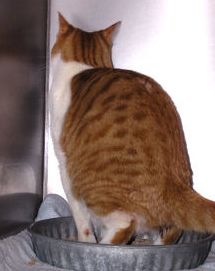 Is immune-mediated colitis inherited? What are the treatment options?
Is immune-mediated colitis inherited? What are the treatment options?
Immune-mediated colitis, a form of autoimmune disease, results from the body’s abnormal response to its own tissues. Something triggers the invasion of the bowel lining by immune cells which destroy the bowel tissues. Complex biochemical and hematological mechanisms create inflamed, thickened and scarred bowel lining… and a very sick patient.
The cause is not well understood, and treatment varies for each pet. An accurate diagnosis is imperative in order to obtain the best therapeutic protocol for the patient. Often a biopsy of the colon wall is required for diagnosis. Hypoallergenic diets can help prevent additional flare-ups. Careful medication with cortisone and special antibiotics is also common, and immune-suppressing drugs may be needed.
How can I prevent constipation in cats?
Cats have unique colon problems, especially with constipation and a problem called megacolon, where the colon stretches and can’t contract and expel the stool. The best thing is to be aware of any discomfort or straining when the pet passes stool. If the cat vocalizes, suddenly jumps out of the litterbox, or defecates in random areas about the house, these are early warning signs of a problem. Consult a veterinarian to prevent long-term colon problems. Changing how much fiber is in your pet’s diet can be helpful. Enemas and stool softeners are often recommended. If megacolon is present, surgical removal of the colon can be very helpful in allowing the cat to live a normal life.
How can I prevent colitis in my dog or cat?
- Feed only the highest quality pet foods that have a meat, poultry, or fish source as the main ingredient, rather than a grain-based food. Higher quality foods are more efficiently digested, have less non-nutritive fiber, provide a better level of nutrition, and help your pet maintain a healthy immune system.
- Talk to your vet if your pet frequently has trouble defecating.
- Keep your pet on a consistent feeding schedule, and don’t overfeed your pet.

